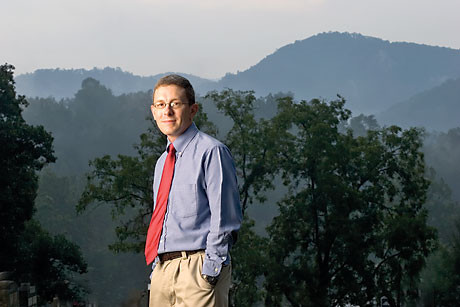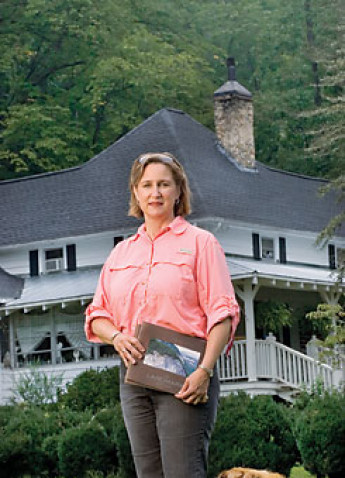SHARE:
COVER STORY
The Carolina Connection
Floridians are buying up homes in North Carolina -- and Florida builders are hot on their heels. But the Sunshine State's brand of development is creating tension in the hills.
21st century boom?
Southwest of Asheville, in a rugged but upscale town called Cashiers, Realtor Jane Ebberts shows up for an interview looking ready for fly-fishing: Jeans, hiking boots and a backcountry blouse. Originally from Buffalo, N.Y., Ebberts and her husband raised a family and pursued careers in central Florida, where she was a software designer. They left for North Carolina in 1997, when he sold his security firm to a national company and retired early. “We really wanted to get back to all four seasons, but not Buffalo’s four seasons.” A friend recommended Cashiers. They came in May and didn’t want to return home, even long enough to sell their house. “It was love at first sight,” Ebberts says. “It’s beautiful weather and a lifestyle, and you’re not going to get attacked by mosquitoes, either.”
|
More Floridians keep second homes in North Carolina than move here full time — in some cases to avoid state income tax. But the ranks of those like the Ebberts who move permanently are growing. The annual number of Floridians switching to North Carolina residency rose from 13,578 in 1990 to 26,653 last year. While Census data doesn’t reflect a major exodus, moving companies are beginning to pick up a trend. In January, United Van Lines reported that for the first time since it began keeping records in 1977 it moved more people out of Florida than into the state. The company’s annual migration survey found North Carolina was the
No. 1 destination state nationally, with a 64% inbound migration rate in 2006. Florida’s rate was 51.2% outbound, 48.8% inbound — a statistical dead heat.
So many Florida home builders are following customers north these days that they report running into each other on the ridges. Ebberts represents area developments by Steven Umansky of Tampa’s LandSource Development, Ian Gail of Sheridan & Gail in Fort Lauderdale, Herb Gimelstob of Boca Raton and Mountain View Ventures, part of Resources Planning of West Palm Beach. Northeast of Asheville, in Linville, Naples-based Lutgert Cos. began developing Linville Ridge near Boone more than 20 years ago; more than 70% of the residents are from south Florida. Other southwest Florida developers, including the Bonita Bay Group in Bonita Springs and Stock Development in Naples, say they are scouting development possibilities in North Carolina but cannot go forward until real estate fortunes in Florida improve.
While all the Florida cash is a boon to mountain economies, it also has created tensions. Just as Floridians rely on European visitors even as they ridicule their Speedos, North Carolina’s mountain communities have long counted on Florida summer-tourist dollars while simultaneously deriding “Floridiots” who drive 25 mph on mountain roads where the posted speed limit is 40.
In recent years, the concerns have become more serious than pokey drivers. Dominated by early-retiree Baby Boomers, the newcomers are bidding up land and housing costs, even as wages and job growth increase only slightly, says Tveidt at the Asheville chamber. As a result, just as in many resort areas of Florida, workers in communities such as Cashiers and Highlands that cater to the newcomers often can’t afford to buy homes there. Other familiar themes: Sprawl, traffic gridlock, air pollution and loss of prime pasture and forestland caused by rapid, poorly planned growth.
In the most rural mountain counties, conflicts are arising as developers import new, unfamiliar types of development, says Jody Higgins, a native of Yancey County east of Asheville. Higgins, publisher of the Yancey County Journal, says Floridians are a well-established part of the culture in places like Pensacola township, where they have mingled with mountain natives since the 1920s, dwelling in modest cabins with spectacular views of the Mount Mitchell range. Several new communities, however, feature much larger homes and gated entrances — once unheard of in Yancey, a quiet, conservative county that continues to ban the sale of liquor, beer and wine.
“Why would you want to live behind a gate in the mountains?” asks Cape, the Asheville city councilwoman. “There’s nothing to be afraid of.”
 “The native-born western North Carolinians may complain about change, but they are the ones who led development of this tourism and second-home economy. We need to understand that growth and change are both inevitable — and work together as insiders and outsiders to plan for it.” — Richard D. Starnes, Western Carolina University history professor [Photo: Kelly LaDuke] |
























